R&D Tax Credits for Architects & Construction
Visiativ has helped many companies in the Architecture & Building industry get access to funding, including R&D Tax Relief.


R&D Tax Relief in the Architecture & Building industry
In the past, architects and construction firms preferred to stick to the tried and tested, with innovations focused more on the look and style rather than the underlying techniques.
Now a range of pressures is driving innovation in the sector – the need to deliver more units more quickly, and to improve sustainability, rising materials costs and a shortage of skilled labour. New materials and technologies could offer solutions, leading to a lot more research and development within the architecture, building services and construction industries.
R&D tax credits can provide significant financial rewards to companies in the architecture, building services and construction sectors. This money can then be used for everything from fuelling future growth to easing cashflow.

Examples of qualifying activity for R&D Tax Relief
Projects which will qualify for R&D tax relief are those which are beyond the bounds of existing knowledge, where the existing data and design rules do not apply, or which involve experimenting or prototyping. For example:
Our customers say…
Before talking to Visiativ we didn’t realise we could claim tax relief on failed R&D projects. This is encouraging us to execute even more innovative ideas, knowing that we can make a claim. We would recommend Visiativ to other businesses. They are a professional organisation with experienced, well-trained and qualified people who know how to convert your R&D into a tax credit claim making your future more sustainable.
Mark Combes, Managing Director, Severn Partnership



How Visiativ can help you
At Visiativ, we can help your company make robust, successful, compliant R&D tax relief claims. Our team of technical experts knows all about the regulations and guidelines specific to claiming R&D tax relief in the architecture, building services and construction sectors. We know what to claim, how to claim and, perhaps most importantly of all, the many pitfalls to avoid.








